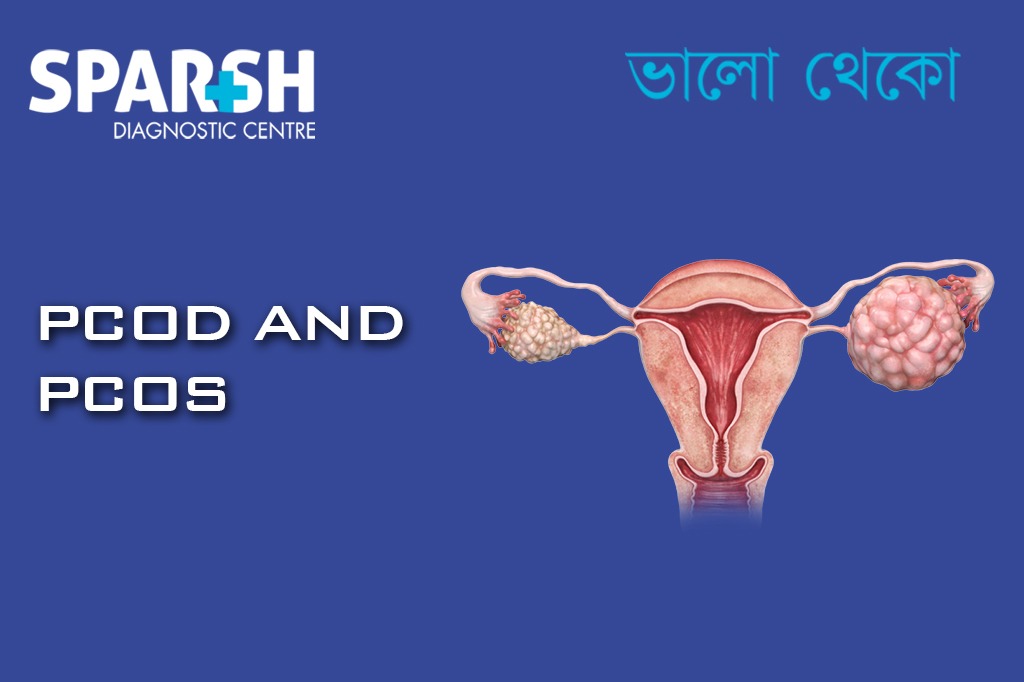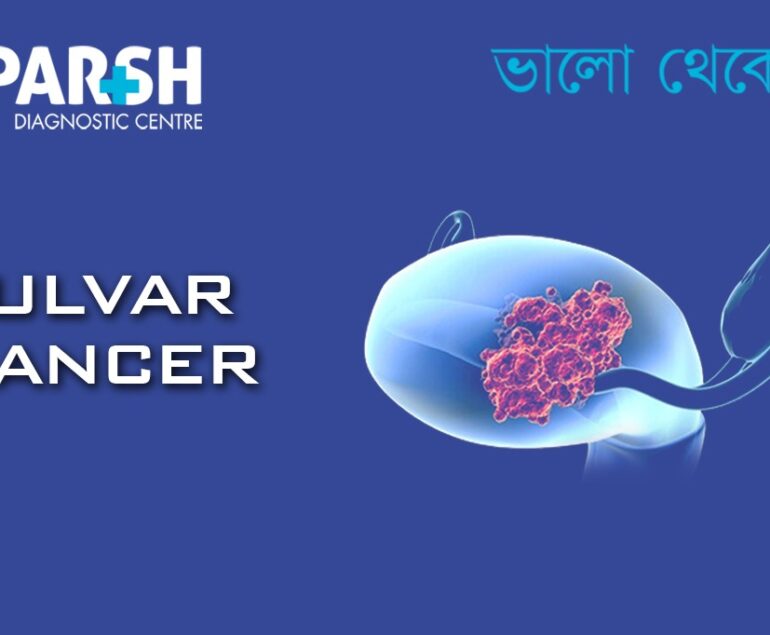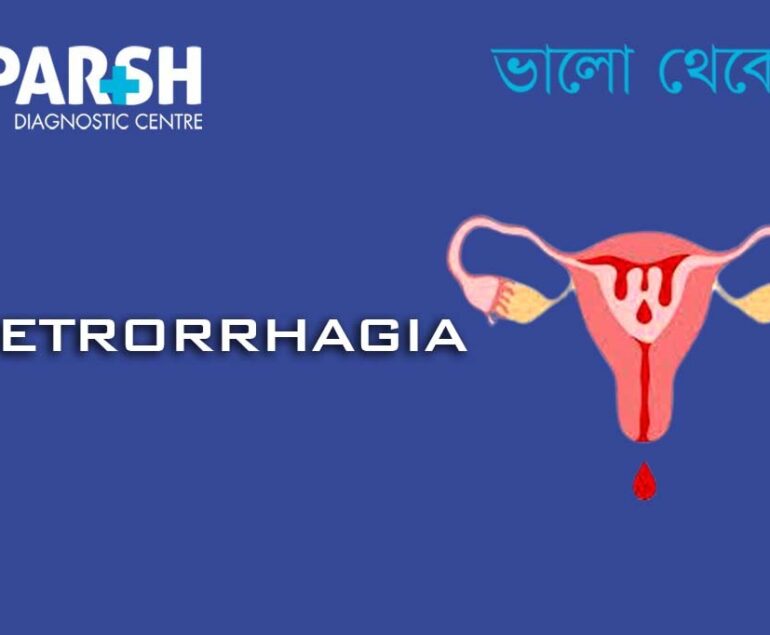Women’s health conditions related to the reproductive system are often confusing, especially when the symptoms overlap. Two such commonly misunderstood conditions are Polycystic Ovary Syndrome (PCOS) and Polycystic Ovary Disease (PCOD). Although the terms are often used interchangeably, they are not the same condition.
At Sparsh Diagnostic Centre, we see many women struggling with irregular periods, weight gain, or fertility issues who are unsure whether it’s PCOS or PCOD. This blog will help clear the confusion by explaining the differences in detail.
What is PCOD?
Polycystic Ovary Disease (PCOD) is a condition where the ovaries release immature or partially mature eggs, which eventually turn into cysts. Women with PCOD usually have enlarged ovaries containing multiple small cysts.
PCOD is considered a lifestyle-related disorder.
It is very common worldwide, affecting almost 1 in 3 women.
With proper diet, exercise, and medications, PCOD can often be managed and even reversed.
Common Symptoms of PCOD
Irregular menstrual cycles
Weight gain and difficulty losing weight
Thinning hair or hair fall
Infertility (though pregnancy is usually possible with medical support)
What is PCOS?
Polycystic Ovary Syndrome (PCOS) is a metabolic and hormonal disorder where the ovaries produce higher-than-normal male hormones (androgens). This interferes with ovulation, leading to fewer eggs being released and the formation of multiple cysts.
PCOS is considered a serious endocrine disorder.
It is less common compared to PCOD but has more severe health consequences.
PCOS is usually chronic and cannot be completely reversed, but it can be managed with treatment.
Common Symptoms of PCOS
Difficulty losing weight despite efforts
Infertility due to anovulation
Long-term risks of diabetes, hypertension, and heart disease
Key Differences Between PCOS and PCOD
Here’s a clear side-by-side comparison:
| Characteristics | PCOS | PCOD |
|---|---|---|
| Occurrence | Less common | Very common in women worldwide |
| Nature | Endocrine disorder of ovaries | Metabolic disorder due to hormonal imbalance |
| Cysts in ovaries | Few cysts present | More than 10 cysts in each ovary |
| Cause | Genetics, lifestyle, eating habits, mental health | Genetics, insulin resistance, inflammation, weight |
| Severity | Cannot be reversed, lifelong management required | Can often be reversed with lifestyle changes and medication |
| Symptoms | Severe irregular periods, infertility, excessive hair growth, obesity | Mild irregularity, acne, weight gain, infertility (but manageable) |
| Treatment | Diet, exercise, lifestyle changes, medications (sometimes hormonal therapy) | Lifestyle modification, medications, and in rare cases, surgery |
| Complications | Infertility, high risk of diabetes, high blood pressure, obesity, endometrial cancer | Easier to conceive with medical aid, lower risk of long-term complications |
Causes of PCOD vs PCOS
While both conditions involve hormonal imbalance, their root causes differ:
PCOD Causes: Poor lifestyle habits, obesity, stress, unhealthy diet, insulin resistance.
PCOS Causes: Genetic predisposition, higher androgen production, hormonal disturbances, and sometimes mental health issues.
Complications
PCOD Complications
Usually manageable with treatment
Fertility issues but not permanent
Lower risk of chronic diseases compared to PCOS
PCOS Complications
Higher chances of type 2 diabetes
Increased risk of hypertension and cardiovascular disease
Greater risk of endometrial cancer
Difficulty conceiving without medical intervention
Diagnosis
Both PCOS and PCOD require a proper diagnostic evaluation. At Sparsh Diagnostic Centre, tests may include:
Ultrasound Scan – to detect ovarian cysts and check ovary size.
Hormonal Blood Tests – to measure levels of testosterone, insulin, and other reproductive hormones.
Glucose Tolerance Test – to assess insulin resistance.
Lipid Profile & Thyroid Tests – to rule out associated conditions.
Treatment Options
For PCOD
Lifestyle changes: balanced diet, regular exercise, stress management
Medications to regulate hormones
Fertility treatments (if required)
In rare cases, surgery may be recommended
For PCOS
Long-term management with lifestyle modifications
Hormonal therapies (birth control pills, anti-androgens, insulin-sensitizing drugs)
Fertility treatments for conception
Regular monitoring to prevent complications
Diet and Lifestyle Management
Both PCOD and PCOS require lifestyle changes for better outcomes:
Adopt a low glycemic index diet (whole grains, fruits, vegetables)
Avoid processed and sugary foods
Exercise regularly (yoga, walking, strength training)
Maintain a healthy weight
Get adequate sleep and manage stress
When to See a Doctor
You should consult a gynecologist or endocrinologist if you experience:
Missed or very irregular periods
Excessive hair growth on face or body
Sudden unexplained weight gain
Difficulty conceiving
Severe acne and hair fall
FAQs on PCOS and PCOD
Q1. Are PCOS and PCOD the same?
No, PCOS is a more serious endocrine disorder while PCOD is a common ovarian condition often linked to lifestyle.
Q2. Can PCOD be cured completely?
Yes, with proper lifestyle changes and medication, PCOD can often be reversed.
Q3. Can PCOS be reversed?
No, PCOS cannot be completely reversed but symptoms can be managed with treatment.
Q4. Which condition is more serious – PCOS or PCOD?
PCOS is more serious due to its long-term health risks and impact on fertility.
Q5. Can women with PCOS or PCOD get pregnant?
Yes, women with both conditions can conceive, but PCOS may require advanced fertility treatments.
Q6. What tests help diagnose PCOS and PCOD?
Ultrasound, hormonal tests, insulin resistance tests, and thyroid/lipid profile tests.
Q7. Does weight loss help in PCOS/PCOD?
Yes, even a 5–10% weight loss can significantly improve symptoms and fertility chances.
PCOD and PCOS are often confused but they are different in severity, complications, and treatment approach. PCOD is more common and manageable, while PCOS is a chronic condition requiring lifelong management.
Early diagnosis through tests like ultrasound and hormone analysis can help women take control of their reproductive health. With proper lifestyle management and medical support, both conditions can be managed effectively.
#BhaloTheko
Disclaimer:
No content on this site, regardless of date, should ever be used as a substitute for direct medical advice from your doctor or other qualified clinician.

![]()





